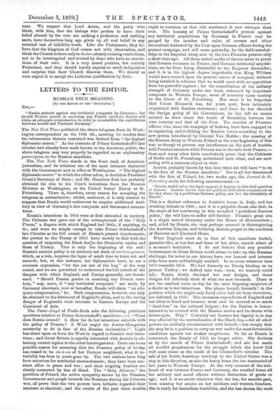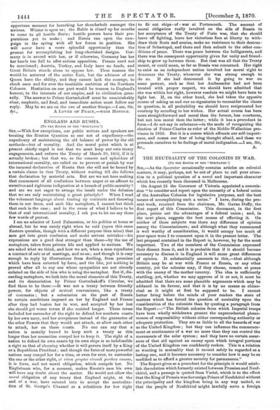LETTERS TO THE EDITOR.
RUSSIA'S TRUE MEANING.
[TO THE EDITOR OF THE "SPECTATOR."]
SIR,— "Russia protests against any territorial conquests by Germany ; but should Prussia persist in annexing any French territory, Russia will claim an adequate compensation in order to re-establish the equilibrium between herself and Northern Germany."
The New York Times published the above telegram from its Wash- ington correspondent on the 16th ult., assuring its readers that the information therein contained was derived from " the highest diplomatic source." As the contents of Prince Gortschakoff's late circular had already been made known to the American public, the above telegram may very properly be regarded as an explanatory postscriptum to the Russian manifesto.
The New York Times stands in the front rank of American journalism, and its relations are of the most intimate character with the Government now in office at Washington. " The highest diplomatic source" to which the editor refers, is doubtless President Grant's Secretary of State ; and Mr. Hamilton Fish has probably obtained his clue to the Czar's intentions from the Russian Minister at Washington, or the United States' Envoy at St. Petersburg. There is, therefore, every reason for accepting the telegram as authoritative ; whilst, moreover, it is only natural to suppose that Russia would endeavour to acquire additional terri- tory in view of Germany's late conquests and threatened annexa- tions.
Russia's intentions in 1854 were at first shrouded in mystery. The Crimean war grew out of the entanglement of the " Holy Places," a dispute with which England had little, if anything, to do ; and were we simple enough to take Prince Gortschakoff's late Circular as the full extent of Russia's present requirements, the parties to the Treaty of 1856 have merely to deal with the question of reopening the Black Sea:to the Muscovite navies and those of Turkey. This is only the beginning of the end ! Russia's exterior policy is an intricate net work of arrieres-pensees, which, as a rule, requires the lapse of much time to trace out and unravel ; but, in this instance, her diplomatists have, to use a common expression, "let the cat out of the bag" at the very outset, and we are permitted to understand the full extent of the dangers with which England, and Europe generally, are threat- ened. " Should Prussia persist in annexing any French terri- tory, " nay, more, if " any territorial conquests " are made by Germany elsewhere, now or hereafter, Russia will claim " an ade- quate compensation," &c. Such compensation, however, can only be obtained to the detriment of England's allies, and to the lasting danger of England's vital interests in Eastern Europe and the Continent of Asia.
The Pester-Lloyd of Pesth-Buda asks the following pertinent questions relative to Prince Gortschakoff's manifesto :-1. "What does Russia intend? 2. How far do her intentions coincide with the policy of Prussia ? 3. What ought the Austro-Hungarian monarchy to do in face of the Russian declaration ?" Light has shone upon us from the West in regard to Russia's real inten- tions ; and Great Britain is equally interested with Austria in ob- taining correct replies to the other interrogatories. There can be no possible reason for assuming that the Prussian policy of to-day has ceased to be vis-à-vis of her Eastern neighbour, what it in- variably has been in years gone by. The two nations have long been notorious for territorial encroachments ; they have been con- stant allies in peace and war ; and their reigning families are closely connected by ties of blood. The " Holy Alliance," the partition of Poland, the active sympathy shown by the Prussian Government and people towards the Russians during the Crimean war, all prove that the two powers have hitherto regarded their interests as identical ; and the events of the past three months ought to convince us that this sentiment is now stronger than ever. The honesty of Prince Gortachakoff's protest against: any territorial acquisitions by Germany in France may be gauged by the number and value of crosses and other decorations bestowed by the Czar upon German. officers during the present campaign, and still more pointedly, by the field-marshal-. ships in the Imperial Army sent to the two Prussian princes only a short time ago. All these varied marks of favour serve to prove that German successes in France, and German territorial acquisi- tions, are far from being distasteful to the Emperor Alexander; and it is in the highest degree improbable that King William would have entered upon his present career of conquest; without being satisfied in advance that he would meet with no opposition from his powerful nephew ; for the consolidation of the military strength of Germany under one head, enhanced by important. conquests in Western Europe, must of necessity cause anxiety to the Court of St. Petersburg. Nor must it be forgotten that Count Bismarck has, for years past, been intimately acquainted with Russian statesmen ; and since he has directed the foreign policy of his Government, he has left no means untried to draw closer the bonds of friendship between his own country and that of the Czar. The number of Prussian officers who, since the campaign of Sadowa, have been engaged in re-organizing and redrilling the Russian forces according to the new system introduced by General Von Moltke ; the massing of the Russian Army in Western Poland at the very beginning of this war, as though to prevent any interference on the part of Austria with Prussian interests while Prussia was in the toils with France,— these and many other facts conclusively prove that the Cabinets of Berlin and St. Petersburg understand each other, and are now acting with a common object in view.
Austria probably knows by this time what she will have "to do in the face of the Russian manifesto." She is all but threatened with the fate of Poland, for, two weeks ago, the Journal de St. Petersburg made the following announcement :—
" Russia would value the loyal support of Austria in this vital question of honour. Austria knows that her political difficulties commenced on the day when, by a perfidious Eastern policy, she lost the friendship of Russia."
This is a distinct reference to Austria's losses in Italy, and her crushing defeats in 1866 ; and it is a palpable threat also that, in the event of her continuing in this so-called " perfidious Eastern policy," she will have to suffer still further. Prussia's great aim is a single united Germany under the House of Hohenzollern ; and, aided by Russia, she may perhaps succeed in disintegrating the Austrian Empire, and reducing Austria proper to the condition of Hanover and Electoral Hesse.
What England must do in face of this manifesto hurled, gauntlet-like, at her feet and those of her allies, cannot admit of
a moment's hesitation. I do not believe that any possible Government in Great Britain could refuse to take up this Russian- challenge, for never in our history have our honour and interest alike been more unblushingly assailed. In no sense whatever does 1870 resemble 1854. We had formerly no Treaty binding us to protect Turkey ; we drifted into war,—how, we scarcely could tell ; Russia slowly disclosed her real designs, and those designs fell infinitely short of what she now demands. There is not the smallest room to-day for the most lingering suspicion of a doubt as to her intentions. She places herself, forsooth I in the position which she might only fairly claim had she been victorious, not defeated, in 1856. The enormous expenditure of England and her allies in blood and treasure must now be entered as so much " dead-loss" in the national ledgers ; for the Euxine is hence- forward to be covered with the Russian navies and its shores with Sebastopols. Why ? Certainly not because her dignity is in any way affected by the neutralization of the Black Sea,—for all other powers are similarly circumstanced with herself,— but simply that she may be in a position to carry on war under the most favourable conditions against her weaker neighbours. So far as Russia is concerned, the Treaty of 1856 no longer exists. She declares so by the mouth of Prince Gortachakoff ; and ahe has made all needful preparations for the struggle which she knew full well must ensue as the result of her Chancellor's circular. The sale of her North-American territory to the United States was a. step in this direction, as also the heavy loans she has contracted of late years in Western Europe. At the very moment of the out- break of war between France and Germany, she recalled home all her military and naval officers without distinction of grade or age ; and it is no secret whatever that she has, for months past, been massing her armies on her southern and western frontiers. She is ready for immediate hostilities, and she has chosen the most
opportune moment for launching her thunderbolt amongst the nations. Winter is upon us ; the Baltic is closed up for months to come to all hostile fleets; hostile powers have their pre- parations yet to make ; and Russia can open the cam- paign in the spring with all her forces in position. She will never have a more splendid opportunity than the present for accomplishing her long-cherished designs. Ger- many is in accord with her, or if otherwise, Germany has her her hands too full to offer serious opposition. France need not be mentioned; Austria, Turkey, and Italy have no funds, and Great Britain stands alone to oppose her. Thus reasons the would-be autocrat of the entire East, but the advisers of our Queen have the ability, and they cannot lack the courage, to check once and for ever the insatiable ambition of the Northern Colossus. Hesitation on our part would be treason to England's honour, to the interests of our empire, and to civilization gene- rally. The answer to Prince Gortachakoff must be unmistakably clear, emphatic, and final, and immediate action must follow our reply. May be we are on the eve of another Sinope.—I am, Sir,
&c., A LOVER OF PEACE, —WITH HONOUR.



































 Previous page
Previous page